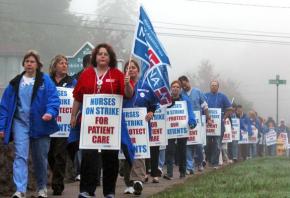Baystate nurses won’t give in
Baystate nurses will hold a one-day strike on February 10, reports .
BAYSTATE FRANKLIN Medical Center (FMC) has declared an impasse in contract negotiations with the hospital's nurses, and on January 21, it unilaterally imposed the terms of its last offer on the nurses' union.
"It is outrageous that management would rather spend its resources to break the law instead of negotiating in good faith, as we are trying to do, to reach a settlement," said Donna Stern, a registered nurse and co-chair of the local bargaining committee of the Massachusetts Nurses Association (MNA).
For the past 28 months, nurses have sought to resolve issue after issue at the negotiating table. The only impasse that ever existed was Baystate's continuous stonewalling.
The nurses have agreed to put all outstanding issues before an independent arbitrator. Baystate refused.
The nurses offered a one-hour "grace period" so that overtime worked for the first hour past the end of a shift would be paid at straight time--a proposal that would write off two-thirds of all "daily overtime." Baystate has refused.

Despite being the reason for the lack of progress in negotiations, management nevertheless unilaterally imposed its "last best offer"--presented more than half a year ago, back in June 2013--on the nurses' union.
The "last best offer" includes the phasing-in of overtime to be paid only after 40 hours each week--as opposed to the current policy of daily overtime pay for any hours worked past a nurse's usual shift.
This is the long-established norm for registered nurses (RNs) in Massachusetts hospitals. Of the 74 acute-care hospitals in Massachusetts, RNs at 45 have MNA contracts. Each of these contracts provides for overtime pay for work beyond the end of the shift. Additionally, most nonunion hospitals have also adopted this standard.
From a patient-care perspective, this only makes sense. The dangers of hospitals relying on mandatory overtime are well documented. Mandatory overtime is unsafe and should be used only under the most dire situations.
But for Baystate, patient care is secondary. The demand to eliminate daily overtime is in line with the Massachusetts Hospital Association's demand for "flexibility," which would routinely compel part-time nurses to work longer shifts--to fill staffing shortages at a lower cost to the hospital.
A 2012 study of Massachusetts hospitals found a significant increase in this use of overtime, with 37 percent of nurses reporting an increase where they work. This year, the MNA gathered more than enough signatures to put a safe-staffing initiative on the state ballot for voters to decide next year.
"The nurses have been clear," said Stern. "We want to reduce and eliminate overtime as a staffing tool. By contrast, Baystate simply wants to eliminate overtime pay, which removes the one disincentive from using overtime as a staffing tool."
Of the 200 RNs at FMC, only nine are 40-hour nurses. The rest are scheduled for between 24 and 36 hours a week. Therefore, under management's proposal nearly 95 percent of the bargaining unit could be forced to work beyond the end of their shifts without overtime pay.
IN TRUTH, Baystate's demands at the bargaining table don't even represent real economic issues for the hospital. If daily overtime were eliminated, the savings would be trivial--about $60,000 a year or less. This amounts to less than 1 percent of total pay for all RNs at FMC.
By contrast, Baystate has already spent more than $500,000 carry out more than two years of negotiations, including hiring the notorious union-busting law firm of Jackson Lewis, taking out full-page ads in local newspapers, sending out mass mailings and so forth.
And to put the $60,000 figure in another context, the total annual overtime costs for all 200 FMC RNs is roughly equal to one week of Baystate Health CEO Mark Tolosky's pay and benefits.
What's really behind Baystate's false claim of an impasse? Union-busting, plain and simple.
Baystate is a viciously anti-union corporate behemoth and, with 10,000 employees, the largest employer in western Massachusetts. Only the 200 nurses at FMC and 45 visiting nurses in Springfield are unionized. The struggle at FMC has become a larger issue than just the nurses there: it has important consequences for all Baystate workers and all workers in western Massachusetts.
In the words of Linda Judd, an RN and co-chair of local MNA bargaining committee: "Beyond any specific issue in dispute, this is a strike for justice in the workplace and the need to make corporate giants like Baystate obey the law in their dealings with employees."
The MNA has filed a complaint with the National Labor Relations Board and called a one-day unfair labor practices strike at FMC on Monday, February 10, starting at 7 a.m.
Baystate has already said that if the nurses strike, they will lock them out and bring in scab nurses. Once again, for Baystate, the point isn't economics but pro-corporate principles. Bringing in scabs for a one-day strike could cost them more than the total amount of the overtime benefits the union is fighting to maintain. But Baystate would rather pay through the nose than allow nurses to have a say over the working conditions that determine whether they are able to provide the quality care that their patients deserve.


